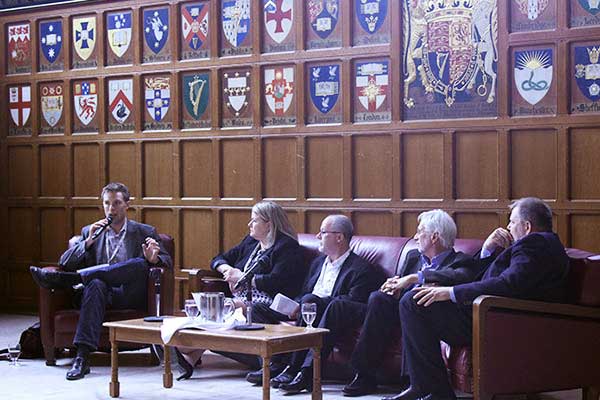
Global Internship Conference asks: where next?
Published: June 26, 2014
“What is driving us to expand internships and service learning?”
That’s what the Globe and Mail’s James Bradshaw asked 350 delegates gathered at the University of Toronto earlier this month. They were there to learn more about internships and experiential education at the 2014 Global Internship Conference (GIC).
The four-day conference held at Hart House was dedicated to advancing the knowledge of academic work placements for students.
The University currently provides a host of experiential learning opportunities, from industry internships, such as U of T Engineering’s Professional Experience Year; to co-op programs hosted locally and internationally, such as UTSC’s Management and Arts & Science Co-op program; to service-learning community placements. But there’s always room for improvement, organizers said – especially as future graduates meet global challenges that are more complex than ever before.
“Solutions to these challenges will require convergent thinking across disciplines," said Judith Wolfson, vice-president, University Relations, during the conference’s opening session. "To develop those competencies, we need to provide more multidisciplinary and experiential learning, and many more opportunities for interactive problem-solving, both inside and outside the classroom or laboratory.”
As a platform for dialogue and vehicle for action, the GIC brought together colleagues to discuss and advance best practices as well as develop and examine a research agenda for global internships.
“The conference was attended by many U of T professionals who were exposed to a variety of international viewpoints,” said Heather Kelly, director of student career exploration and education at U of T’s Career Centre, and GIC committee member. “It helps us see where we can change or improve our own ideas and processes to provide more meaningful learning experiences for our students.”
This year’s conference included sessions on improving students’ international internship experience and employability, discussions on unpaid internships versus co-op placements, a student panel on global internships, and a panel discussion on how experiential learning transforms youth employment, and the role of government, industry and post-secondary institutions.
The panel was a particular highlight for many attendees. Moderated by Bradshaw, the panel included Rick Halpern, University of Toronto Scarborough's dean and vice-principal (academic), and Rocco Fondacaro, director of University of Waterloo’s Co-operative Education and Career Action. Their talk covered a range of important topics, from the increasing challenge of meeting students’ growing demand for work placements, to why institutions need to be mindful of how cultural norms affect experiential learning, and what employers are seeking in graduates.
"More employers are looking for those who don’t just have credentials but real-world experience, whether it is internships, summer employment, or extracurricular activities. It shows their ability to transition into the workplace,” said panellist Richard Wiggers, research manager, High Education Quality Council of Ontario.
This year’s GIC was the first to be held in Canada.
“The conference was very well received and delegates were very impressed with the cultural diversity of the University and of the city,” said Kelly. “Hart House itself was an ideal venue for an international conference, as delegates shared that it embodied both the traditional and transformational aspects of U of T’s rich history and future.”
Next year’s GIC will take place at the University College of Dublin.



